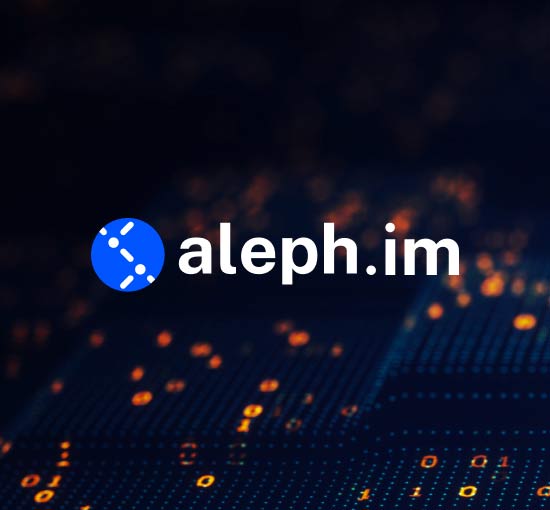Trading Aleph (ALEPH) on Beaxy
What Is Aleph (ALEPH)?
Aleph is an open-source crosschain network with a decentralized identity (DID) system and a decentralized database, including file storage. The main goal of Aleph is to assist decentralized applications and protocols in removing the centralized components from their stack in order to achieve a fully decentralized architecture. Aleph can be compared to a decentralized Firebase or AWS. Aleph’s primary goal is to revitalize the DeFi ecosystem.
Who Founded Aleph?
In 2018, Jonathan Schemoul, also known as Moshe Malawach, developed Aleph. Moshe was born in France and has been a programmer for his whole life.
Moshe built corporate software for financial, supply chain, and other key sectors before moving into the blockchain space. Later, he developed the Explorer and the Proof of Credit Mining (POCM) method, among other things, and rose to prominence in the NULS community.
Aleph is what it is today thanks to Moshe’s ability to use blockchain technology to add real commercial value.

How is Aleph.im Unique?
Onchain and offchain decentralized technologies are uniquely combined in Aleph. Offchain, its decentralized network is only accessible through blockchain networks. This enables crucial features such as security and advanced crypto-economics.
Numerous popular blockchain projects, including Ethereum, Polkadot, Cosmos, and BinanceChain, are already Aleph compatible. This makes it possible for any project developed on these platforms to use decentralized file and database storage.
Last but not least, Aleph incorporates a channel architecture that permits sharding, or creating subnetworks, with all of Aleph’s network functionalities. Shards can be compared to specialized cloud clusters.
Being independent of any particular blockchain is what sets ALEPH apart. It simply provides a way to deploy virtual computers that node administrators maintain to the suit specific computational needs of the user, without worrying about the code that rules a Dapp or blockchain.
ALEPH has an edge over other interoperable cloud storage options in that it was an early adopter. As Aleph begins its third year of development after meeting its roadmap objectives for the previous two years, more concrete use cases will start to materialize.
Aleph is a resource that is definitely worth learning more about if one is attempting to predict what technological advancements will affect the future of the internet. They have started deploying a crucial piece of technology that will serve as the framework for the new internet.
How to Manage Transactions?
As long as web-dapp teams pay them, onchain transaction fees are free for users. This is a similar business model to web2, in which app owners pay cloud providers like AWS. Since onchain transactions are batch processed, costs are low.
Last but not least, Aleph offers delegated transactions. Users do not need to manually resubmit transactions or change their fees because the network handles these activities.
The Management of Data
There is the option to make data public, but by default, data is private and encrypted. Data is only kept on the bare minimal number of nodes required. Nodes in certain geolocalizations can store data.
Aleph and IPFS are interoperable. Therefore, the data is duplicated on both systems (IPFS and aleph.im nodes).
What Purpose Does the ALEPH Token Serve?
- Staking tokens are utilized as network security collateral,
- Reward tokens are used for running nodes, staking tokens, and cloud service provision.
- Payment Token are used to pay for synchronization, computation, and storage services.
How Many ALEPH Coins Are in Use Right Now?
There were 69.73 million ALEPH tokens in circulation as of 2020. There was no ICO for Aleph. The Proof of Credit Mining (POCM) platform, which paid stakers in ALEPH tokens, required NULS tokens to be staked during the first minting process. In July 2020, the overall token supply was cut in half. At this time, there are tokens available for use by stakers, node operators, liquidity providers, marketers, and businesses.

Aleph historical price
Decentralized - Transparent - Immutable
People frequently turn to trading on a cryptocurrency exchange to make money with cryptocurrencies. There are numerous tactics that can be used by investors of varying knowledge and experience levels, as well as those committing different sized investments. Most ALEPH trading pairs with USD: ALEPH/USD.

In order to make the biggest profits, traders frequently employ a fast-deal (scalping) strategy, in which transactions are completed in a matter of minutes, the trader calculates even the smallest changes in value, and the profits from dozens or hundreds of transactions of this nature add up to a sizable profit. This method of trading benefits greatly from the extreme volatility of cryptocurrencies. Moreover, a lot of traders choose for medium-term trading, when the transaction is completed over the course of one or more days. In these circumstances, traders employ trend indicators to forecast the future movement of the coin’s value with the highest degree of precision. Some investors prefer to retain assets for a long period of time and make long-term investments; nevertheless, this type of trading requires a significant initial commitment and only produces modest gains.


 Buy
BuyPurchasing cryptocurrency on a cryptocurrency exchange is simpler and safer. For instance, you can purchase ALEPH on the Beaxy market with USD: aleph - eth . Inflation concerns decrease since the ALEPH coin’s maximum issue is constrained. News about various rival projects and trading volumes may have an impact on the cryptocurrency’s rate. The price might decrease if a big investor decides to sell a lot of coins in one day—far more than is customary. The opposite is also true: if a large number of coins are purchased in a single day, the price may increase. To predict the future movement of an asset’s value, numerous methodologies and automated tools examine the market. Each customer who signs up for a Beaxy account receives a personal analyst who stays in touch with them via personal chat and is available to answer any questions. The opportunity is open to both newcomers and seasoned market participants who require expert advice.
Aleph exchange
Additionally, bitcoin exchanges are the most practical places to exchange cryptocurrencies. ALEPH may typically be exchanged for USD, for instance on the Beaxy exchange: aleph - eth . This process can be finished by a novice thanks to the Beaxy cryptocurrency exchange’s user interface. After quickly registering, you will be given a number of options for making a deposit. You must first swap your fiat money for Bitcoin before exchanging it for the desired cryptocurrency, such as ALEPH. All of this happens swiftly and effortlessly, and if you’ve ever bought fiat money or stock on the stock exchange, you’ll be familiar with the procedure. Cryptocurrency exchanges are just as simple as exchanges of traditional currencies. Therefore, the Beaxy cryptocurrency exchange and your individual expert analyst will serve as your trustworthy colleagues along your journey if you have decided to familiarize yourself with the world of cryptocurrencies and begin earning from such investments.
